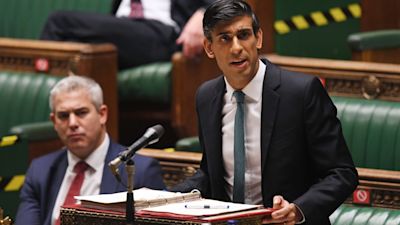Spending Review: Sunak freezes public sector pay as debt soars to £394bn and unemployment rises

Video report by ITV News Political Correspondent Paul Brand
Rishi Sunak has revealed the eye-watering cost of fighting the coronavirus pandemic, with UK borrowing set to hit almost £400 billion, the economy expected to contract by 11% and unemployment predicted to rise to 7.5%.
The chancellor, announcing his Spending Review, said Britain's "economic emergency has only just begun" and the damage to the economy caused by the Covid-19 pandemic is likely to be "lasting".
The Office for Budget Responsibility (OBR) estimates that £20-30 billion would need to be made up in either spending cuts or tax rises in order to balance the books and stop debt from rising by the end of this Parliament.
Business Editor Joel Hills gives an update
The OBR forecast that the economy would shrink by 11.3% this year, amounting to the worst recession for more than 300 years.
With UK borrowing rising to 19% of GDP (the monetary measure of the goods and services produced by a country) - £394 billion - by the end of this year, it will be at the highest level ever recorded in peacetime.
The OBR has warned another £10 billion will need to be borrowed on top of that if the UK exits the European Union without a trade deal.
In a bid to claw back some of billions spent, Mr Sunak froze public sector worker pay rises, apart from doctors and nurses, and broke a manifesto pledge by cutting the international aid budget from 0.7% of GDP to 0.5%.
The move to slash international aid has come in for lots of criticism, most notably from former PM David Cameron, who said he "deeply regrets" Mr Sunak's "mistake".
Foreign Office minister Baroness Sugg resigned in protest at the cut, branding it "fundamentally wrong", despite Mr Sunak insisting it was his "intention" to return it to 0.7% when possible.
Shadow chancellor Anneliese Dodds attacked the public sector pay freeze, saying it will deliver a "sledgehammer" blow to consumer confidence, while the government had mismanaged the finances on an "industrial scale".
NHS doctors and nurses will receive a pay rise and the 2.1 million public sector workers who earn below the median wage of £24,000 will be get pay rise of at least £250 next year.
The minimum wage will increase by 2.2% to £8.91 an hour, with this rate extended to those aged 23 and over.
The chancellor told MPs that the Office for Budget Responsibility did not expect the economy to return to its pre-crisis levels until the end of 2022 and the damage was likely to last.
The "long-term scarring" would mean that in 2025 the economy will be around 3% smaller than expected in March.
Mr Sunak said: "Our health emergency is not yet over. And our economic emergency has only just begun.
"So our immediate priority is to protect people's lives and livelihoods."
The OBR forecasts show a recovery is expected over the coming years, with growth of 5.5% forecast next year as coronavirus restrictions are eased, then 6.6% in 2022, 2.3% in 2023, 1.7% in 2024 and 1.85 in 2025.
Here are some of Sunak's biggest spending pledges:
Coronavirus fight - £93 billion: £38 billion will help public services to continue fighting the pandemic this year and a further £55 billion for next year. This cash will fund programmes on mass testing, test and trace, personal protective equipment, and vaccines.
Defence - £24 billion: The biggest investment in the defence budget in 30 years will see up to 10,000 thousand jobs created annually across the UK.
Restart scheme - £2.9 billion over three years: This scheme is designed to help more than one million unemployed people find work. Those out of work for more than 12 months will be provided with "regular, intensive" jobs support tailored to their circumstances.
Prisons - £4 billion: This cash is designed to help create 18,000 new prison places across England and Wales.
Education - £2.2 billion: Some of this cash will contribute to rebuilding 500 schools over the next decade.
Job Centre Plus - £1.4 billion: The government is providing cash to Job Centres to increase capacity so they can deal with the surge in people searching for work.
Kickstart scheme - £1.6 billion: This will fund the creation of up to 250,000 new job placements for 16 to 24 year olds on Universal Credit who are at risk of long term unemployment.
Skills support - £375 million: Some £138 million of this will be spent on the Lifetime Skills Guarantee, which offers free college courses to adults without A-level or equivalent qualifications. £127 million will be invested in work academies and traineeships.
Infrastructure - £100 billion: This will contribute to long-term projects and a national infrastructure bank. £4 billion will go towards the "levelling up" fund to finance local infrastructure improvement projects.
Devolved administrations: £2.4 billion for Scotland, £900 million for Northern Ireland and £1.3 billion for Wales.
The chancellor said: “My number one priority is to protect jobs and livelihoods across the UK.
“This Spending Review will ensure hundreds of thousands of jobs are supported and protected in the acute phase of this crisis and beyond with a multi-billion package of investment to ensure that no one is left without hope or opportunity”.
The OBR said: "The economic outlook remains highly uncertain and depends upon the future path of the virus, the stringency of public health restrictions, the timing and effectiveness of vaccines, and the reactions of households and businesses to all of these.
"It also depends on the outcome of the continuing Brexit negotiations."
Watch Rishi Sunak's announcement in full: